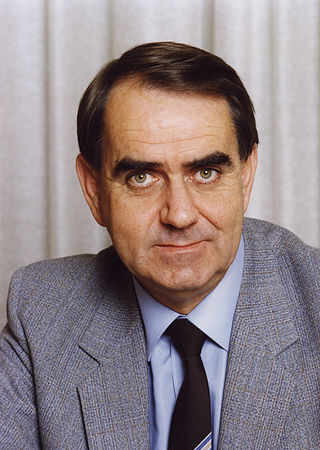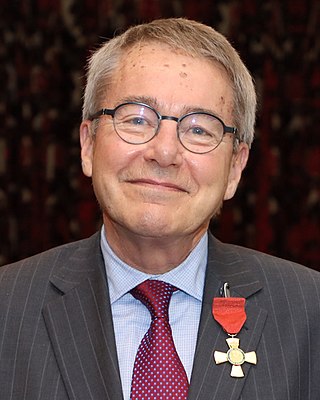Related Research Articles

David Francis Caygill is a former New Zealand politician. He was born and raised in Christchurch. He entered politics in 1971 as Christchurch's youngest city councillor at the age of 22. He served as a Member of Parliament (MP) from 1978 to 1996, representing the Labour Party. A supporter of Rogernomics, he served as Minister of Finance between 1988 and 1990. From 2010 to 2019, he was one of the government-appointed commissioners at Environment Canterbury.

Sir Edward Denis Blundell, was a New Zealand lawyer, cricketer and diplomat who served as the 12th Governor-General of New Zealand from 1972 to 1977.
Richard Owen Collinge is a former New Zealand cricketer, who played 35 Tests and 15 ODIs. He was New Zealand Cricket Almanack Player of the Year in 1971.

Sir Barry John Curtis is a retired New Zealand local-body politician, who served as mayor of Manukau City from 1983 until 2007. When he announced his intention to retire in 2007, he was New Zealand's longest-serving mayor at that time.

Jane Theresa Wrightson is New Zealand's Retirement Commissioner. She was previously New Zealand's eighth Chief Censor, and first woman Chief Censor, from 1991 to 1993, when Films, Videos, and Publications Act became law.

Michael John Duffy is a former Australian politician and lawyer. He was a senior minister in the Australian Labor Party (ALP) governments from 1983 to 1993, serving as Minister for Communications (1983–1987), Minister for Trade Negotiations (1987–1990), and Attorney (1990–1993). He was a member of the House of Representatives from 1980 to 1996, representing the Victorian seat of Holt.

Guy Winston Salmon is a New Zealand environmentalist.
Barry Edward Brill is a New Zealand lawyer and ex-politician. Brill was parliamentary under-secretary for Energy, Science and Technology, Regional Development and National Development in the Third National Government from 1978 to 1981.
David John Butcher is a former New Zealand politician of the Labour Party. He was a Cabinet minister in the Fourth Labour Government.

John Brian Burke is a former mayor of Porirua City, Wellington Region, New Zealand. Prior to his time as mayor from 1983 to 1998, he served 12 years as a city councillor with six years from 1977 to 1983 as deputy mayor. After a 15-year absence from the city council, in 2013 and 2016 he stood for election as a city councillor in the eastern ward, and was elected. In September 2019 Burke announced he would not be seeking re-election, ending 48 years of continuous public office which began in 1971.
Patrick James Downey was a New Zealand barrister and solicitor. He served as the Chief Human Rights Commissioner, and was chairman of the Human Rights Commission from 1978 to 1984. He was director of legal publishers Butterworths of New Zealand between 1983 and 1993, editor of the New Zealand Law Journal from 1983 to 1996, and general editor of The Laws of New Zealand from 1991 to 1995.
The Pakistan national cricket team toured New Zealand from December 1964 to February 1965 and played a three-match Test series against the New Zealand team. All three Tests were drawn.
Sir John Henderson Ingram was a New Zealand engineer and businessman. He was managing director of New Zealand Steel from 1969 to 1987, and later served as a member of the Waitangi Tribunal.
John Newton Dodd was a New Zealand physicist who worked in the field of atomic spectroscopy.

Michael John Albert Brown was a New Zealand judge. In 1980, he became the first Māori to be appointed as a District Court judge, and he was later the first principal Youth Court judge.

Sir George Alan Chapman is a New Zealand accountant, businessman and company director. He was president of the National Party from 1973 to 1982.
Neville Garde Austen Young was a New Zealand lawyer. He served as president of the National Party from 1986 to 1989.
Sir Walter Edwin Bate was a New Zealand politician. He served as mayor of Hastings from 1953 to 1959.
Denis Blake Pain was a New Zealand jurist and sports administrator. He was a judge of the District Court from 1970 to 1990, subsequently serving as deputy director of the Serious Fraud Office. In the 1980s and 1990s, he was chef d'équipe of the New Zealand eventing team at four world championships and Olympic games.
John Clarence Hinchcliff is a New Zealand university administrator, philosopher, politician and peace campaigner.
References
- ↑ "John Collinge". ESPNcricinfo. Retrieved 22 October 2010.
- 1 2 3 "Another Waltz with Matilda". University of South Australia. 27 March 2007. Archived from the original on 6 June 2011. Retrieved 22 October 2010.
- ↑ "Player Profile: John Collinge". CricketArchive. Retrieved 5 March 2013.
- ↑ "Declaration of result of election" (PDF). Auckland Energy Consumer Trust. 3 November 2003. Retrieved 24 August 2019.
- ↑ Collinge, John (12 June 2003). "John Collinge: Long may the Queen reign over us". The New Zealand Herald . Retrieved 22 October 2010.
- ↑ Taylor, Alister (1998). The New Zealand Roll of Honour. Alister Taylor. p. 269. ISBN 0-908578-58-X.